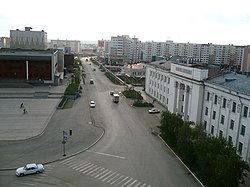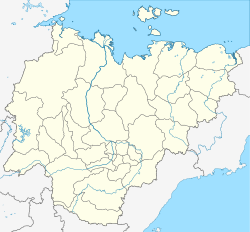Yakutsk
| Yakutsk (English) Якутск (Russian) Дьокуускай (Sakha) |
|
|---|---|
| - City - City under republic jurisdiction |
|
 View of the city from the Geological Institute collections area |
|
 Location of the Sakha (Yakutia) Republic in Russia |
|
|
|
|
|
|
|
|
|
|
| City Day | Second Sunday of September |
| Administrative status (as of June 2009) | |
| Country | Russia |
| Federal subject | Sakha Republic |
| Administratively subordinated to | city of republic significance of Yakutsk |
| Capital of | Sakha Republic |
| Administrative center of | city of republic significance of Yakutsk |
| Municipal status (as of December 2008) | |
| Urban okrug | Yakutsk Urban Okrug |
| Administrative center of | Yakutsk Urban Okrug |
| Head | Aysen Nikolayev |
| Representative body | Okrug Council |
| Statistics | |
| Area | 122 km2 (47 sq mi) |
| Population (2010 Census) | 269,601 inhabitants |
| - Rank in 2010 | 68th |
| Density | 2,210/km2 (5,700/sq mi) |
| Time zone | YAKT (UTC+09:00) |
| Founded | 1632 |
| City status since | 1643 |
| Postal code(s) | 677xxx |
| Dialing code(s) | +7 4112 |
|
|
|
| on | |
Yakutsk (Russian: Якутск; IPA: [jɪˈkutsk]; Yakut: Дьокуускай, Cokuuskay, pronounced [ɟokuːskaj]) is the capital city of the Sakha Republic, Russia, located about 450 kilometers (280 mi) south of the Arctic Circle. Population: 269,601 (2010 Census);210,642 (2002 Census);186,626 (1989 Census).
Yakutsk is a major port on the Lena River. It is served by the Yakutsk Airport as well as the smaller Magan Airport. It is a major supplier of diamonds. Its average winter temperature is −34 °C (−30 °F), which makes Yakutsk the coldest city of its size or greater in the world.
The Turkic Sakha people, also known as the Yakuts, migrated to the area in the 13th and 14th centuries from other parts of Siberia. When they arrived they mixed with other indigenous Siberians in the area. Russian Yakutsk was founded in 1632 as an ostrog (fort) by Pyotr Beketov. In 1639, it became the center of a voyevodstvo. The Yakutsk Voyevoda quickly became the most important Russian official in the region and directed expansion to the east and south.
Yakutsk did not grow into a city until the discovery of large reserves of gold and other minerals in the 1880s and 1890s. These reserves were developed extensively during industrialization under Stalin. The rapid growth of forced labor camps in Siberia was also a major factor encouraging Yakutsk’s development.
...
Wikipedia



